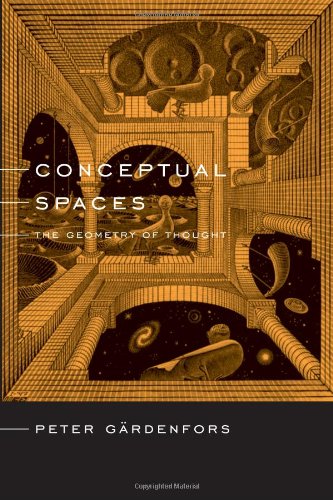Verwandte Artikel zu Conceptual Spaces : The Geometry Of Thought (Bradford...

Inhaltsangabe
Within cognitive science, two approaches currently dominate the problem of modeling representations. The symbolic approach views cognition as computation involving symbolic manipulation. Connectionism, a special case of associationism, models associations using artificial neuron networks. Peter Gardenfors offers his theory of conceptual representations as a bridge between the symbolic and connectionist approaches.
Symbolic representation is particularly weak at modeling concept learning, which is paramount for understanding many cognitive phenomena. Concept learning is closely tied to the notion of similarity, which is also poorly served by the symbolic approach. Gardenfors's theory of conceptual spaces presents a framework for representing information on the conceptual level. A conceptual space is built up from geometrical structures based on a number of quality dimensions. The main applications of the theory are on the constructive side of cognitive science: as a constructive model the theory can be applied to the development of artificial systems capable of solving cognitive tasks. Gardenfors also shows how conceptual spaces can serve as an explanatory framework for a number of empirical theories, in particular those concerning concept formation, induction, and semantics. His aim is to present a coherent research program that can be used as a basis for more detailed investigations.
Die Inhaltsangabe kann sich auf eine andere Ausgabe dieses Titels beziehen.
Críticas
"This is a fearless book that casts a wide net around key issues in cognitive science. It offers the kind of coherent, unified view that the field badly needs." - Steven Sloman, Associate Professor, Cognitive and Linguistic Sciences, Brown University"
Reseña del editor
Within cognitive science, two approaches currently dominate the problem of modelling representations. The symbolic approach views cognition as computation involving symbolic manipulation. Connectionism, a special case of associationism, models associations using artificial neuron networks. Peter Gardenfors offers his theory of conceptual representations as a bridge between the symbolic and connectionist approaches. Symbolic representation is particularly weak at modeling concept learning, which is paramount for understanding many cognitive phenomena. Concept learning is closely tied to the notion of similarity, which is also poorly served by the symbolic approach. Gardenfors's theory of conceptual spaces presents a framework for representing information on the conceptual level. A conceptual space is built up from geometrical structures based on a number of quality dimensions. The main applications of the theory are on the constructive side of cognitive science: as a constructive model the theory can be applied to the development of artificial systems capable of solving cognitive tasks. Gardenfors also shows how conceptual spaces can serve as an explanatory framework for a number of empirical theories, in particular those concerning concept formation, induction and semantics. His aim is to present a coherent research program that can be used as a basis for more detailed investigations.
„Über diesen Titel“ kann sich auf eine andere Ausgabe dieses Titels beziehen.
EUR 8,00 für den Versand von Frankreich nach Deutschland
Versandziele, Kosten & DauerSuchergebnisse für Conceptual Spaces : The Geometry Of Thought (Bradford...
Conceptual Spaces _ The Geometry of Thought
Anbieter: San Francisco Book Company, Paris, Frankreich
Paperback. Zustand: Very good. Paperback Octavo. wraps, 307 pp owners bookstamp to half title page Standard shipping (no tracking or insurance) / Priority (with tracking) / Custom quote for large or heavy orders. Artikel-Nr. 102315
Anzahl: 1 verfügbar
Conceptual Spaces: The Geometry of Thought
Anbieter: Second Story Books, ABAA, Rockville, MD, USA
Hardcover. Octavo; VG-/VG; black spine with white text; dust jacket exterior shows minimal handling wear; cloth exterior has some whitish smudges; good, solid binding; text block exterior edges have minimal wear; interior clean; illustrated; pp 307. 1363805. FP New Rockville Stock. Artikel-Nr. 1363805
Anzahl: 1 verfügbar

